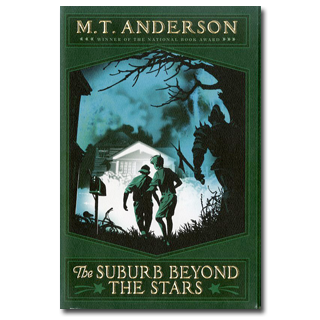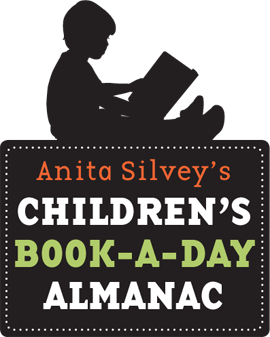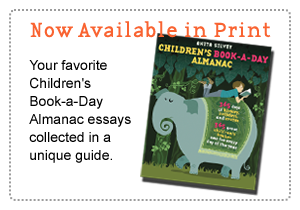
A FEW OTHER EVENTS FOR
DECEMBER 27:
- Happy Birthday Diane Stanley (Leonardo da Vinci, Bella at Midnight).
- It’s the birth date of Ingri Parin D’Aulaire (1904–1980) Abraham Lincoln, D’ Aulaires’ Book of Norse Myths.
- In 1831, Charles Darwin embarked on his journey aboard the HMS Beagle, during which he began to formulate the theory of evolution. Read Charles Darwin and the Beagle Adventure by A. J. Wood and Clint Twist, The True Adventures of Charlie Darwin by Carolyn Meyer and The Tree of Life by Peter Sis.
- Happy birthday to New York City’s Radio City Music Hall, which opened in 1932.
- It’s National Fruitcake Day. Read Junie B. Jones and the Yucky Blucky Fruitcake by Barbara Park, illustrated by Mark Podwal.
As I sit writing, a storm rages outside my window. Some branches scrape against the house. This creepy setting mirrors the one found in our book of the day, M. T. Anderson’s The Suburb Beyond the Stars.
In December we celebrate Read a New Book Month. Of all the new books this year, I had the most fun reading Anderson’s offering for fourth through sixth graders. The two heroes introduced in Anderson’s 2004 The Game of Sunken Places, Brian and Gregory, are still working on the details of the next round of their game, which pits the Norumbegans against the Thusser Horde. But to their surprise, the Horde doesn’t play by the rules and makes a preemptory move. Taking over America, block by block, the Horde has been building and infiltrating suburban developments.
However, our heroes discover their plot and set out to foil it. Every chapter contains breathless action. Children today love to read for plot, and Anderson gives them what they want! I was so exhausted at the end of each chapter—so many chases and villains foiled—that I had to take a break and breathe. Like all plot-driven books, The Suburb Beyond the Stars must be read to the end, to find out what happens to our heroes.
Anderson’s delicious use of language and phrasing distinguishes him from his contemporaries. “The man’s face was riddled with old pockmarks, scumbled like cottage cheese.” That line sent me to the dictionary to think about scumbled. Always clean-shaven and never in pursuit of hirsute himself, Anderson manages to use that word effortlessly in a children’s book. He also weaves in parodies of Pete Seeger songs, re-creations of scenes from The Night of the Living Dead, and a lot of other cultural references that will keep adults laughing along with young readers. Every paragraph has been developed with intelligence, a respect for language, and an even greater respect for children. They can read the saga simply to find out how nasty villains like Gelt the Winnower fare, or they can think about some of the underlying issues—how do suburban developments alter our society? Either way, when they finish the book, they’ll be several hundred words richer.
So for your reading group or your family’s enjoyment, pick up The Suburb Beyond the Stars. You can read it on a rainy night or in the bright sunshine. Either way, it will leave you smiling.
Here’s a passage from The Suburb Beyond the Stars:
So Brian kept walking, dragging his cello. Sometimes he wished he’d chosen a smaller instrument. Even the viola would have been better.
Originally posted December 27, 2010. Updated for 2019.






Parodies of Pete Seeger songs? Can’t wait!
What I love most about M.T. Anderson’s writing is that he assumes his young readers’ intelligence and their capacity to understand complex themes and vocabulary. As you mention in your comment about the word “scumbled,” he always manages to extend his audience’s vocabulary in a way that not only feels effortless, but also exciting. Who knew that racing for the dictionary could be so thrilling?
I look forward to reading this book myself, and also to passing it down to the younger readers in my life.